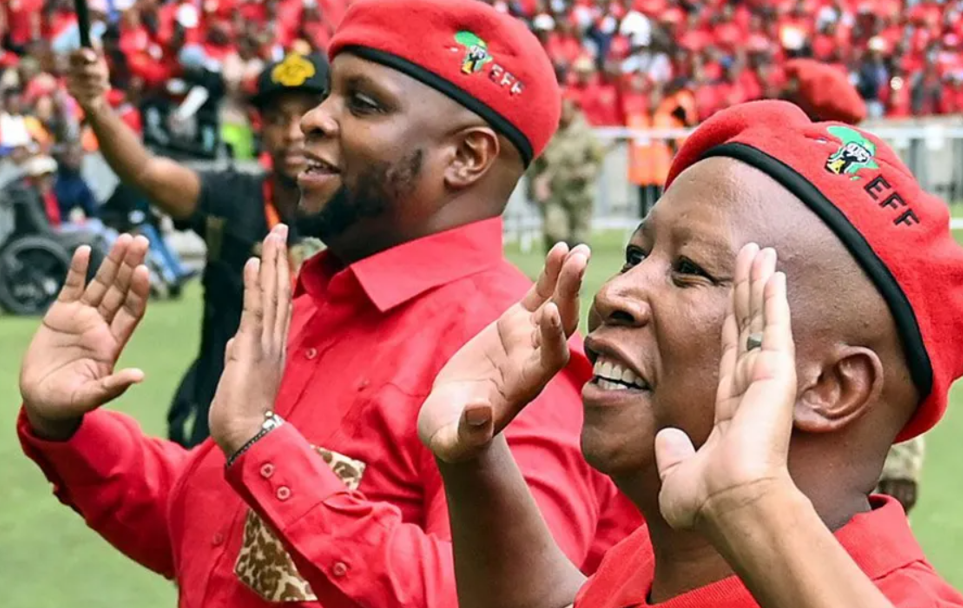For more than ten years, the Economic Freedom Fighters (EFF) have shaped South Africa’s political scene. But things have been very turbulent inside the party recently, especially after Floyd Shivambu—the party’s deputy leader—decamped to the fledgling uMkhonto weSizwe (MK), sometimes called the Spear of the Nation. At this pivotal moment in South African politics, the EFF’s future is profoundly affected by this change.
The Ascent and Fall of the EFF
When Julius Malema and Floyd Shivambu established the EFF in 2013, they got a lot of support for their extreme economic proposals. The decolonization of education and the nationalization of white-owned land and mines were causes that Malema passionately advocated for. Shivambu, the party’s ideological lynchpin, lent his intellectual rigor and strategic acumen to these causes.
The EFF suffered a major defeat in the national elections that took place in May, notwithstanding its earlier triumphs. The EFF’s decline to fourth place runs counter to their goals of becoming the second-largest party. Part of the blame for this downturn should go to the rise of MK, which changed the political dynamic in South Africa by drawing support away from the EFF and the governing ANC.
The Floyd Shivambu Defection
There has been a dramatic change at the EFF headquarters since Floyd Shivambu left for MK. Their alliance was crucial to the party’s early success, and historically, Shivambu and Malema were viewed as a powerful duo. Shivambu’s betrayal casts doubt on the EFF’s long-term viability and heralds a personal and political split.
Following a time of political instability and internal strife inside the EFF, Shivambu has decided to join MK, a party headed by former President Jacob Zuma. Adding more complexity to the political environment is the alignment with MK, which has experienced internal issues such as numerous leadership changes and charges of corruption.

Julius Malema (R) was once an ally of Jacob Zuma (L) and used to lead the ANC’s youth wing
Examining the Consequences of Shivam bu’s Action
Shivambu’s decision to go to MK could have multiple consequences:
A shift in the political spectrum in South Africa has resulted from the defectors’ departure. Shivambu’s move helped MK unexpectedly climb, which shows its increasing influence. This change might affect the EFF’s capacity to win over new members and hold on to old ones.
The internal dynamics of the EFF: The charismatic head of the EFF, Julián Malema, is currently going through a time of self-reflection and may be unstable. As the party deals with the fallout from Shivambu’s departure, its internal unity may be at risk. Given the lack of a formidable opponent, political expert Moeletsi Mbeki posits that Malema’s power could further solidify.
Claims of Corruption: The fact that Shivambu has defected brings up new concerns regarding the corruption issue that encompasses both him and Malema. Their reputations could be ruined if they are accused of taking large bribes from the owner of a bank that has since been dissolved. Both have denied any wrongdoing, but the ongoing inquiry could further jeopardize their political careers.
An Overarching Political Setting
The political climate in South Africa is not immune to the wider effects of these events. Suppose the EFF and MK are unable to work together or gain substantial governmental positions. In that case, they may be unable to tackle important national concerns, including economic reform, unemployment, and service delivery.
The Strategic Errors of EFF and MK
By choosing not to be a part of President Cyril Ramaphosa’s coalition administration, the EFF and MK have both committed strategic mistakes. Because of this lost chance, they are in a politically unstable position, especially because the ANC is separating itself from the EFF in different municipal coalitions.
Also disheartening for MK were the by-elections that took place recently in KwaZulu-Natal, which is Zuma’s political heartland. Voters’ discontent with the party’s performance in office is evident in their criticism of its emphasis on opposition rather than government.
Anticipated Future Events
Both the EFF and MK’s futures are up in the air as the political climate changes. With Shivambu’s resignation comes new difficulties and possibilities for the EFF. During this time of change, the party must deal with both internal and external challenges. The party needs to strengthen its leadership and define its political position before Shivambu’s integration can help MK gain traction.
Finally, the current political changes in South African politics are highlighted by the recent EFF and MK shifts. These events will have far-reaching effects on the country, shaping future political alignments and the efficiency of government.



















